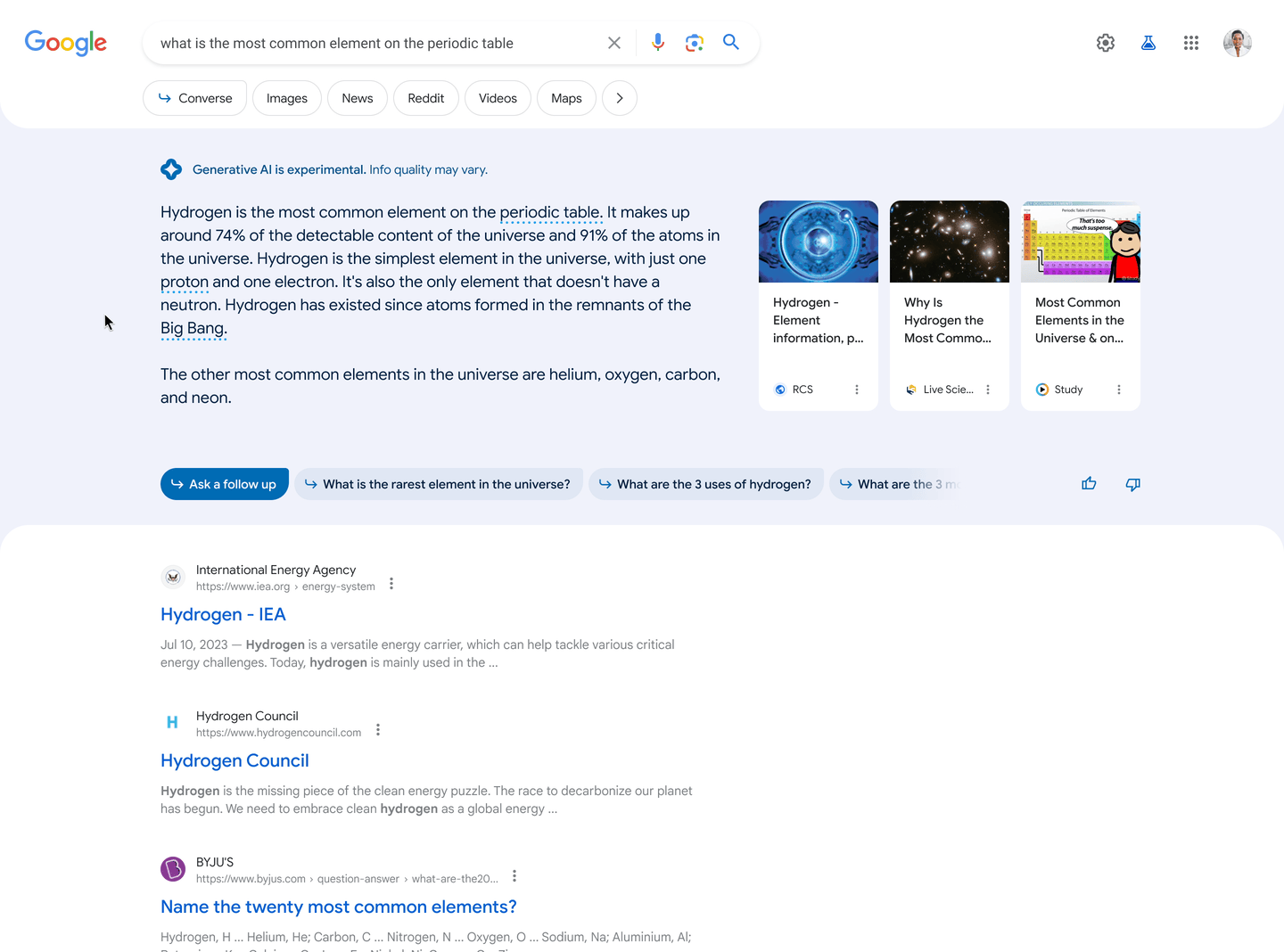Google SGE expands to 120 countries while adding new follow-up questions, AI translation help and more definitions
SGE now in more countries, more languages with more features.
The generative AI version of Google Search, Google Search Generative Experience, is now rolling out to over 120 countries and territories. Google also added new ways to follow up with AI-generated search answers, new AI translation help, and additional AI-powered definitions.
This is Google’s “largest global expansion yet” of SGE, the company announced.
SGE Follow-up questions
Google is now testing a new way for searchers to ask follow-up questions within the SGE search results page. As you continue to explore a topic, you can easily see your prior questions and search results, Google explained.
Here is what it looks like:

This update will start to roll out over the coming weeks, starting first in English in the United States, Google said.
SGE AI-translation help
Shalom! When one word can have multiple translations, it can be a bit confusing to understand the meaning. That is why SGE AI-translation is adding context to your translations. Google explained, “Let’s say you want to translate “is there a tie?” from English to Spanish. It seems straightforward, but it’s possible that the word tie could refer to either a piece of clothing or a contest with no winner.”
When Google Search finds there may be more than one meaning or translation for a word or phase, Google will underline the terms. You can then tap any of those words and you can indicate the specific meaning that reflects what you want to say. This option may also appear when you need to specify the gender for a particular word, Google added.
Here is what it looks like:

More SGE definitions
SGE now supports showing more definitions from its initial launch of this feature in August. In August, SGE showed definitions for educational topics — like science, economics, or history. Now Google is expanding those definitions for categories such as coding and health information.
Here is what those look like:

This update is rolling out over the next month, in English in the United States, with more countries and languages expected to follow soon, Google said.
120 countries/territories and more languages
SGE is also rolling out in Search Labs to 120 countries and territories and more languages. These countries include most of Latin America, South Korea, Indonesia, and Sub-Saharan Africa. Plus, SGE will work for four new languages for everyone using SGE: Spanish, Portuguese, Korean and Indonesian.
Here is how it looks in Spanish:

Here are the countries SGE is now currently supported in (help document here):
- American Samoa
- Angola
- Antigua and Barbuda
- Bahamas
- Bangladesh
- Barbados
- Belize
- Benin
- Bhutan
- Bolivia
- Botswana
- Brazil
- Brunei
- Burkina Faso
- Burundi
- Cambodia
- Cameroon
- Cape Verde
- Central African Republic
- Chad
- Chile
- Colombia
- Comoros
- Congo [DRC]
- Congo [Republic]
- Cook Islands
- Costa Rica
- Côte d’Ivoire
- Dominica
- Dominican Republic
- Ecuador
- El Salvador
- Equatorial Guinea
- Eritrea
- Eswatini
- Ethiopia
- Fiji
- French Guiana
- Gabon
- Gambia
- Ghana
- Grenada
- Guadeloupe
- Guam
- Guatemala
- Guinea
- Guinea-Bissau
- Guyana
- Haiti
- Honduras
- Indonesia
- Jamaica
- Kenya
- Kiribati
- Kyrgyzstan
- Laos
- Lesotho
- Liberia
- Madagascar
- Malawi
- Malaysia
- Maldives
- Mali
- Marshall Islands
- Mauritius
- Mexico
- Micronesia
- Mongolia
- Mozambique
- Myanmar
- Namibia
- Nauru
- Nepal
- New Zealand
- Nicaragua
- Niger
- Nigeria
- Niue
- Northern Mariana Islands
- Pakistan
- Palau
- Panama
- Papua New Guinea
- Paraguay
- Peru
- Philippines
- Puerto Rico
- Rwanda
- Saint Kitts and Nevis
- Saint Lucia
- Saint Vincent and the Grenadines
- Samoa
- São Tomé and Príncipe
- Senegal
- Seychelles
- Sierra Leone
- Singapore
- Solomon Islands
- Somalia
- South Africa
- South Korea
- South Sudan
- Sri Lanka
- Suriname
- Taiwan
- Tajikistan
- Tanzania
- Thailand
- Timor-Leste
- Togo
- Tokelau
- Tonga
- Trinidad and Tobago
- Turkmenistan
- Tuvalu
- U.S. Virgin Islands
- Uganda
- United States Minor Outlying Islands
- Uruguay
- Uzbekistan
- Vanuatu
- Venezuela
- Vietnam
- Western Sahara
- Zambia
- Zimbabwe
Related stories
New on Search Engine Land